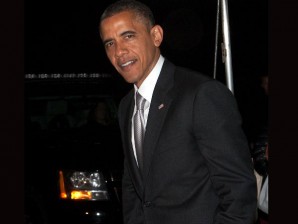Florida icing on the cake of Obama’s poll victory

US President Barack Obama arrives at the White House in Washington on November 7, 2012 upon his return from Chicago, one day after his re-election. AFP PHOTO/Nicholas KAMM
MIAMI—US President Barack Obama’s top aide in Florida said on Thursday that the Democrats had won the vote in the officially undeclared Sunshine State, where officials are under fire for mishandling the ballot.
Obama ended up not needing the biggest swing state as he won enough states across the country to romp to a decisive electoral college victory in Tuesday’s election, but his team believes they triumphed in any case.
“On behalf of Florida Democrats, I wish President Barack Obama congratulations on his reelection and on winning Florida’s 29 electoral college votes,” Florida Democrats chair Rod Smith said in a statement.
Mitt Romney’s senior campaign adviser in Florida hinted earlier that the Republican presidential challenger lost the state, where a result is still to be announced more than two days after the election.
Electoral officials have said all vote returns must be completed no later than Saturday, but the statement from Romney’s campaign published in the Miami Herald suggested his team had already accepted defeat.
“The numbers in Florida show this was winnable. We thought based on our polling and range of organization that we had done what we needed to win,” senior campaign adviser Brett Doster said in the statement.
“Obviously, we didn’t, and for that I and every other operative in Florida has a sick feeling that we left something on the table,” he added.
332 electoral votes
Obama campaign manager Jim Messina said he was confident the president would be declared the victor.
The campaign’s voter model continues to show that Obama “will hold that lead and end with 332 electoral votes,” Messina said.
In the state-by-state electoral college system, 270 votes were needed for victory and Obama already has 303 with Florida’s 29 still outstanding.
Slow count
Votes are still being counted in three of Florida’s 67 counties, said Chris Cate, a spokesperson for the state government.
“Counties are required to report their results to us by Saturday at noon,” Cate told Agence France-Presse.
The slow count of presidential votes are still being counted in Florida has evoked memories of the acrimonious 2000 election that was finally resolved by the US Supreme Court over a month later.
This year the Sunshine State did not play a pivotal role in the national race, as Obama was reelected on Tuesday after winning enough electoral college votes to reclaim the White House.
Florida was arguably the most coveted prize on Election Day, with 29 electoral college votes up for grabs—more than any of the other states that swing between Republican and Democratic control in the presidential poll.
In 2000 Democrat Al Gore, who won the US popular vote, lost the election to Republican George W. Bush, who triumphed under the electoral college system when a divided US Supreme Court stopped a ballot recount in Florida.
Republicans have control of both houses in Florida’s state legislature and the governor’s mansion, but a growing Hispanic and more liberal population are pushing the electorate toward Obama’s Democrats.
Florida Deputy Elections Supervisor Christina White blamed the vote count delay on an unusually long ballot and a high voter turnout.
“It’s not that there were any problems or glitches. It’s about volume and paper left to be processed,” White said.
As of Thursday, votes were still being counted in three of Florida’s 67 counties—including the cities of Jacksonville, Fort Lauderdale and Palm Beach. Vote counting in the Miami area was completed on Thursday morning.
Manipulating the outcome
But at least two Florida vote experts saw the chaos as the result of a raw, bare-knuckled Republican attempt to suppress turnout.
“Election officials in Florida said the same thing in 2000—the turnout caught them by surprise,” said Lance deHaven-Smith at Florida State University.
“But the truth is that turnout in presidential elections in Florida is usually between 70 and 75 percent of registered voters.”
For him the chaos is because “an entrenched Republican political class is trying to fend off a rising tide of Democratic voting.”
Republican state officials have been “intentionally undersupplying voting places and equipment” to create bottlenecks in traditionally Democratic strongholds, “thereby reducing Democratic voting and manipulating the election outcome,” he said.
Partisan interests
Charles Zelden, a history and law professor at Nova Southeastern University in Florida, said the southern state’s Republican legislature wanted to slow down voting for partisan purposes.
He pointed to a law signed last year by Gov. Rick Scott reducing the number of early voting days from 14 to eight and eliminating early voting on the Sunday before Election Day.
Democrats tend to do better in early voting, so limiting the number of people voting ahead of Election Day would likely have favored Romney.
“The blame,” Zelden said, “lies with the fact we allow the partisans to run our elections.”
Voting in the United States is “controlled by the states, which are run by politicians with partisan objectives. Hence the problems,” he added.
While projections have indicated that the Florida vote has been close since the start, the statement given by Doster to the Herald, indicated that it had gone Obama’s way.














